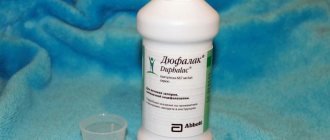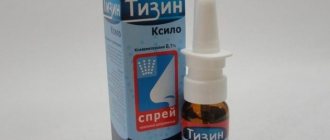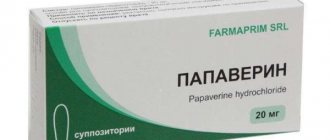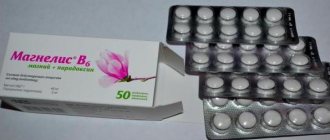Is Rinostop prescribed to pregnant women?
Instructions for use of the drug Rinostop, the active ingredient of which is xylometazoline, lists pregnancy and lactation as contraindications. Why then do doctors prescribe it?
The thing is that during pregnancy, respiratory tract diseases can develop, in which the action of vasoconstrictor drops or spray is simply necessary. Therefore, the use of the drug in question is permissible in the absence of contraindications. Children's Rinostop is usually prescribed during pregnancy with a concentration of the active substance of 0.05%.
Use of medication during different periods of pregnancy:
- The period of the first trimester is considered the most important stage in the development of the unborn baby. All organs and systems of the body are formed. Exposure to medications in the 1st trimester is extremely undesirable. During this period, for runny noses, means for irrigating and washing the nasal mucosa based on sea water (Humaris, Solin, Aquamaris) are prescribed. They are absolutely harmless.
- In the second trimester, the likelihood of a threat to the unborn child from taking medications is significantly reduced. Therefore, for rhinitis of allergic, bacterial origin and other ENT diseases, the drug in question may be prescribed. During pregnancy, Rinostop in the 2nd trimester is allowed to be used only after a doctor’s prescription. The specialist evaluates the clinical picture, studies the anamnesis to exclude contraindications, consults with a gynecologist and decides on the advisability of using vasoconstrictor drops in complex therapy.
- The third trimester is the final stage of pregnancy. The baby is almost completely formed. All systems and organs are only improving in the last 16 weeks. It is not advisable to use Rinostop drops in the 3rd trimester. Strong corticosteroids have a negative effect on the labor of the uterus.
How to treat a runny nose during pregnancy? The best means
Catching a cold is always undesirable, but getting a runny nose during pregnancy means creating the possibility of additional danger for the baby. After all, toxins of viruses and bacteria can penetrate the mother’s blood and, through the placenta, into the blood of the fetus and affect the development of the unborn child.
But not everything is so scary at first glance: on the way to the child’s body, the infection is blocked by the mother’s immunity and a reliable placental barrier. Therefore, the appearance of a runny nose is not a disaster; every woman during gestation suffers infectious rhinitis at least once.
It is important to treat it correctly, avoiding the development of complications.
In addition, a severe runny nose with copious discharge in a pregnant woman, with sneezing and itching, and nasal congestion does not necessarily mean that she has contracted a viral-bacterial infection. There are other forms of rhinitis that are quite common during pregnancy.
What can you do for a runny nose during pregnancy?
Throughout the entire period of the position, the mother’s body experiences increased stress, since it is necessary to ensure the normal functioning of the fetus, fight the attacking microflora, and compensate for possible previously acquired somatic diseases.
The fetal body also has a huge impact on the mother, changing her hormonal status, metabolism, affecting all organs and systems.
This “balance of forces” changes throughout gestation; in different trimesters, the maternal body reacts differently to many external and internal factors. The same applies to inflammation of the nasal mucosa: runny nose in those expecting a baby comes in a variety of forms, and their frequency varies by trimester.
- 1st trimester: in the vast majority of cases, a runny nose of infectious origin is diagnosed; very rarely and in the presence of an allergic mood before pregnancy - a runny nose of allergic origin.
- 2nd trimester: the frequency of infectious rhinitis and the so-called “runny nose of pregnant women” due to hormonal reasons is almost the same; Allergic rhinitis is diagnosed less frequently.
- 3rd trimester: runny nose in pregnant women comes first, the infectious form comes in second, and the allergic form comes in third.
to the content?
Principles of treatment of runny nose during pregnancy
Depending on the form of the disease:
Each form of rhinitis has its own causes and its own pathogenesis, that is, the mechanism of development of the disease. Clinical symptoms are also different for different types of inflammation.
In order to competently treat rhinitis in the early or late stages of gestation, you should understand what can be taken for a runny nose during pregnancy and what is undesirable, you need to understand the essence of each form of pathology.
A very specific form, rhinitis in pregnant women, is possible only during gestation. Its main reason is the hormonal effect of the fetus on the mother's body. During pregnancy, a woman's endocrine changes begin from the first day, then increasing with each month. The growing fetus also begins to produce its own hormones.
As a result, maternal estradiol and fetal estriol lead to a significant dilation of the capillaries of the nasal mucosa, swelling, sneezing, congestion and impaired sense of smell.
Another mechanism for the development of runny nose in pregnant women is an increase in the volume of circulating blood in the mother’s body.
With each month, in those “in pregnancy” it increases, leading to an increase in pressure in the capillaries of the nose, the release of blood plasma elements from them, and swelling of the mucous membrane.
It is these two mechanisms that explain the fact that rhinitis in pregnant women in the early stages usually does not occur, but appears in the 2nd or 3rd trimester. Does it require treatment?
Usually no, because it does not pose a great danger to the mother and fetus. In rare cases, with persistent nasal congestion, vasoconstrictor drops in a very small dosage may be recommended.
Another form of runny nose, infectious, requires complex treatment and a very careful approach. The mechanism of pathology development occurs in several directions, on which the principles of therapy are based.
To destroy viral-bacterial microflora, antiseptics are needed, and antipyretics are needed to eliminate its pyrogenic effect.
Vasoconstrictors (vasoconstrictor nasal medications) will help reduce swelling of the mucous membrane and reduce the production of mucopurulent secretion - rinsing the nasal cavity.
It is also necessary to restore the integrity of the epithelium and its functionality, normalize local immunity (immunomodulators, inhalations, local heat, vitamin therapy).
If a woman suffered from any form of allergy before pregnancy, then during the gestation period the likelihood of increased clinical symptoms increases sharply.
New forms of pathology may also appear, an example of which is rhinitis of allergic origin. The mechanism of its development is based on the sensitization of the body to a certain antigen and the formation of an atypical response to its penetration into the body.
Since during pregnancy it is impossible to radically influence the cause of allergic rhinitis, it is only possible to carry out symptomatic treatment.
This means careful administration of vasoconstrictors, antihistamines, hormonal drugs, immunomodulators, protective agents and cell membrane stabilizers. It is very important to try to limit the expectant mother’s contact with the allergen.
to the content?
Remedies for infectious rhinitis during pregnancy
A disease of viral-bacterial origin always occurs with manifestations of intoxication. The woman feels malaise, weakness, headache, and possibly an increase in body temperature.
At the same time, nasal congestion and copious discharge appears, which from transparent mucous becomes mucopurulent. In order to get rid of these symptoms as quickly as possible and not harm the baby, medications of various types are used.
to the content?
Nasal drops for pregnant women with a vasoconstrictor effect
Very successfully eliminate swelling of the nasal mucosa. As a result, congestion disappears and nasal breathing is restored. But they must be used very carefully, do not exceed the dose, do not increase the frequency of doses or the duration of the course. Vasoconstrictor drugs are insidious in their ability to cause the mucous membrane to become “accustomed” to them, as well as the possibility of a systemic effect on the body of the mother and child.
- Vasoconstrictor nasal agents based on phenylephrine (the most gentle on the mucous membrane, they are short-acting drugs): Vibrocil, Polydexa, Nazol Baby, Rinza.
- Vasoconstrictor drugs based on oxymetazoline (more effective, but there is a risk of systemic exposure, they are long-acting drugs): Nazivin, Afrin, Nazol.
- Vasoconstrictor nasal drops based on xylometazoline (sufficient effectiveness, classified as drugs with an average period of action): Galazolin, Xylen, Xymelin, Rinorus, Snoop, Rinostop.
- Vasoconstrictor drugs based on naphazoline (act sparingly, have a short period of action): Naphthyzin, Naphazolin, Sanorin.
Other symptomatic remedies and methods of treatment for infectious rhinitis
An important area of treatment is the release of the nasal cavity from the contents, restoring the integrity and functionality of the mucous membrane. The most optimal would be not just regular blowing of the nose, which can injure the epithelium, but rinsing the nose with special solutions.
Pharmacies offer Aqua Maris, Aqualor and others for this purpose, but you can prepare such a solution yourself. One teaspoon of ordinary salt per 1 liter of water - and the product is ready. You need to rinse your nose up to 3-4 times a day using a teapot with a long spout. The effect occurs after the first procedure: the nose begins to breathe freely, and secretion production decreases. Absolutely safe for the fetus.
To simultaneously narrow the capillaries, relieve nasal congestion, reduce the amount of discharge and speed up the regeneration of the epithelium, you can use herbal decoctions. Herbs such as calendula, sage, chamomile can be used for instilling a decoction into the nose, 2-3 drops up to 6 times a day, and for regular rinsing of the nasal cavity.
If the expectant mother has a runny nose and her body temperature rises above 38 degrees, then antipyretics are indicated (Paracetamol or Aspirin 0.5 once). To speed up recovery and normalize immunity, inhalations and thermal procedures are very effective. The main condition is not to conduct them at elevated temperatures.
Inhalation of steam over hot herbal decoctions (chamomile, sage, potatoes) and local heat to the nasal area (hot boiled eggs, bags of heated salt, warm potato cakes) are recommended.
to the content?
Drops for allergic rhinitis during pregnancy
The main medications for allergic rhinitis are antihistamine nasal drops.
Depending on the time of development, they are divided into:
- first generation drugs (rarely used because they have side effects);
- second generation agents (more effective, few side effects): Fenistil, Levocabastine;
- third generation drugs (maximum effect, minimum adverse reactions, providing additional vasoconstrictor or barrier effects): Prevalin, Allergodil.
Any drops for a runny nose during pregnancy should only be prescribed by a doctor. A competent choice of a drug, taking into account all the characteristics of a woman’s body and her strict adherence to all medical recommendations, is the key to successful treatment of rhinitis without the slightest harm to the unborn child.
to the content?
How to treat a runny nose during pregnancy: video
Share with friends
Rate this article: (5 ratings, average: 5.00 out of 5) Loading…
nasmorkam.net
Instructions and dosage
It is especially important to use Rinostop in the form of a spray or drops correctly during pregnancy in order to minimize the risk of complications. The instructions for use warn of dangers when increasing the dosage and duration of treatment. Consider the manufacturer's recommendations:
- Before using the drug, the nasal passages must be rinsed with saline solution (1 tablespoon per 0.5 liter of water) or a ready-made pharmaceutical product.
- When administering the medicine, the head is slightly tilted back or held straight. Pregnant women are recommended to use children's Rinostop 1-2 drops in each nasal passage no more than 3 times a day. If the drug is in the form of a spray or aerosol, then 1 injection.
The maximum vasoconstrictor effect is achieved half an hour after using the medicine. It should last 5–6 hours.
Please note that the drug is addictive. Therefore, it is not recommended to use it for more than 3 days.
Rinostop price
Rinostop price in Moscow:
- Rinostop nasal drops 0.1% and 0.05% 10 ml - 21 - 25 rubles;
- nasal spray 0.1% And 0.05% 15 ml - 56 - 65 rubles.
Rinostop tablets, produced by the pharmaceutical company Bosnalek (Bosnia and Herzegovina) are not synonymous with Rinostop drops and spray, as they have a different composition.
- Online pharmacies in RussiaRussia
ZdravCity
- Rinostop Aqua Soft nasal spray.
6+months 125ml Laboratory De La Mer RUR 312 order - Rinostop Aqua Norm nasal spray. 3+ years 125mlLaboratory De La Mer
RUB 327 order
- Rinostop Aqua Forte nasal spray. 6+months 50mlLaboratory De La Mer
RUB 265 order
- Rinostop Aqua Baby nasal spray. 0+months 125mlLaboratory De La Mer
RUB 292 order
- Rinostop Aqua Forte nasal spray. 6+months 125mlLaboratory De La Mer
RUB 324 order
Pharmacy Dialogue
- Rinostop Aqua Soft spray 50ml De La Mer Lab.
RUB 213 order
- Rinostop spray 0.1% 15mlFS.-Leksredstva
105 rub. order
- Rinostop Aqua Soft spray 125ml De La Mer Lab.
RUB 339 order
- Rinostop nasal drops 0.1% 10mlLekko JSC
39 RUR order
- Rinostop spray 0.05% 15mlFS.-Leksredstva
82 RUR order
Contraindications
It is important to study and exclude the presence of contraindications before using the medication. And during pregnancy, this issue must be approached with all responsibility. Let's look at the list of contraindications.
Basically, these are conditions that require monitoring of pulse and blood pressure:
- If a pregnant woman suffers from atherosclerosis.
- Drops are not prescribed for thyroid pathologies.
- When cerebral circulatory or coronary insufficiency is diagnosed.
- For atrial fibrillation.
- If glaucoma is diagnosed.
- If a woman suffers from hypertension.
- The decompensated form of diabetes mellitus is a contraindication.
- For hyperthyroidism.
- If the patient is taking medications for depression (tricyclic antidepressants and MAO inhibitors).
- If you have recently had surgery on the meninges.
- If you have an individual intolerance to the components of the drug Rinostop.
Medicines based on adrenomimetics with a vasoconstrictor effect are strictly prohibited for use by pregnant patients suffering from the following diseases:
- laryngitis;
- pharyngitis;
- atrophic rhinitis.
Drops and spray "Rinostop" in the nose and eyes: composition, for children and during pregnancy
For comfortable use, manufacturers of topical medications offer consumers spray forms. They do not differ from drops in their chemical composition and pharmacological action. In this material we will look at the Rinostop spray, which is also available in the pharmacy chain in the form of nasal drops. The difference between these two forms lies only in the retail cost. Well, ease of use should not be discounted either.
Making a choice is not difficult, considering that only a drop form can be instilled into the eyes; a spray is absolutely not suitable for these purposes. There are also significant differences between pediatric and adult concentrations of the main active ingredient.
Basic rules of application:
- a doctor’s consultation is not required to prescribe;
- if a runny nose does not go away within 3 days from the start of treatment, you should seek medical help;
- This medicine can be used for no more than 7 days for adults, and no more than 5 days for children under 12 years of age;
- before instillation, it is necessary to clear the nasal passages of mucus; you can rinse them with a weak salt solution;
- Instillation should be done with the head tilted back and tilted to the side opposite the nostril being instilled;
- The spray can be used with the head in the normal position; tilting and throwing it back is not necessary.
When using independently, carefully read the contraindications and standard dosages. Strictly adhere to the above recommendations.
Composition of "Rinostop" drops in the nose and eyes, pharmacological action
Nasal drops "Rinostop" belong to the group of pharmacological agents based on adrenergic agonists from the alpha group. They have a pronounced vasoconstrictive pharmacological effect when applied topically. Upon penetration into the middle layers of the mucous membrane, they have a tonic effect on the capillary wall. Blood vessels become more elastic, their walls lose pathological permeability. Due to this, normal blood supply is restored, swelling is eliminated, and the production and secretion of mucous secretion stops.
The chemical composition of Rinostop is quite simple, which reduces the risk of side effects and worsening the patient’s condition. The main active ingredient is xylometazoline hydrochloride, its action is complemented by potassium and sodium chlorides and phosphates. These substances help cleanse the ciliated epithelium and stimulate its natural regeneration. In the solution for adults, the main active ingredient is contained in a concentration of 0.1%; for children, the dosage is reduced by 2 times - 0.05%.
Spray and drops are available for sale in various packaging; for short-term use, a bottle with 10 ml of solution is sufficient. If long-term treatment is necessary, you can purchase a bottle containing 30 ml of the drug.
"Rinostop" can be instilled into the eyes if there are appropriate indications for the purpose of symptomatic effects. For these purposes, a children's form with a xylometazoline concentration of 0.05% is used. instill 1 drop into each eye 3-4 times a day until lacrimation and swelling of the mucous membrane of the eyelids are completely eliminated.
The drug is practically not absorbed into the blood and has no effect on the chemical composition of the plasma or the state of the central nervous system. Only a local vasoconstrictor effect is observed. If the rules of use are violated, an atrophic form of rhinitis, degeneration of the muscular layer and expansion of the nasal cavities may develop. Repeated use after a course of therapy is possible no earlier than 21 days.
The patient experiences relief 5-10 minutes after applying the medicinal solution to the mucous membrane. The therapeutic effect of the spray begins faster due to the greater coverage of the spray area and the absorption of xylometazoline.
Indications and contraindications for the use of "Rinostop"
The main indications for the use of this drug are various allergic and inflammatory rhinitis, accompanied by severe nasal congestion, swelling and friability of the mucous membrane, and copious secretions.
Nasal drops "Rinostop" are used as a symptomatic remedy for the following pathologies:
- conjunctivitis of mixed and unspecified etiology;
- rhinitis and sinusitis, including acute sinusitis, frontal sinusitis and ethmoiditis;
- otitis media of the middle ear in the presence of damage to the Eustachian tube and a feeling of stuffiness;
- colds of viral and bacterial etiology (adenoviral infection, acute respiratory infections and acute respiratory viral infections, influenza);
- adenoiditis, complicated by disruption of the process of mucus discharge.
It is also possible to use it for prophylactic purposes during the preparation of the patient for intranasal types of diagnostic studies. This procedure reduces the risk of bleeding and penetration of a secondary form of pathogenic microflora.
Contraindications for Rinostop include conditions that require constant monitoring of blood pressure and heart rate. These are pathologies of the thyroid gland, atherosclerosis, coronary and cerebral circulatory insufficiency, atrial fibrillation and hypertension. It is also not recommended for use in cases of decompensated diabetes mellitus and hyperthyroidism.
In the chronic atrophic form of rhinitis, pharyngitis and laryngitis, vasoconstrictor drugs based on any adrenergic agonists are strictly contraindicated. And these nasal drops are no exception.
| Dosage and treatment regimens | |
| Adults with acute rhinitis with profuse rhinitis | 0.1% solution every 4 hours, 3 drops in each nostril |
| Children aged 2 to 12 years | 0.05% solution every 6 hours, 2 drops in each nostril |
| Dosage for children by year | 2-4 years - 1 drop, 5-7 years - 2 drops, 8-12 years - 3 drops |
Is Rinostop possible during pregnancy and for children?
In some cases, "Rinostop" can be used by pregnant women as an emergency remedy in the absence of contraindications. But for such use it is necessary to consult a doctor and compare the risk of developing preeclampsia. This is due to the possibility, against the background of an altered hormonal background, of accelerated absorption of the active substance and the development as a result of this short-term spasm of small blood vessels of the placenta.
In this regard, it is recommended to replace Rinostop during pregnancy with a safer pharmacological drug that does not have this ability. An alternative may be formulations based on plant materials. According to data provided by manufacturers, the period of childbearing and breastfeeding is considered a conditional contraindication. However, there is no reliable information based on clinical trials about harm to the health of the child. Thus, “Rinostop” can be recommended to women during this period of their life only in cases of extreme necessity, taking into account other provocative factors.
Children and adolescents are not a contraindication for the use of this drug. But it is worth considering that “Rinostop” for children is available in a special form of drops with a reduced concentration of the active substance. In some cases, when it is necessary to quickly eliminate a runny nose and nasal congestion in a baby, and only an adult concentration of the solution is at hand, before use it is necessary to dilute the drug by half with clean boiled water.
A solution with a xylometazoline concentration of 0.05% is allowed for use in children over 2 years of age. Before this period, the drug is not used due to the risk of side effects and negative effects on the development of the central nervous system.
If you have questions for your doctor, please ask them on the consultation page. To do this, click on the button:
nasmorkunet.ru
Side effects
Unpleasant phenomena may occur after violating the recommendations regarding the dosage and duration of use of Rinostop drops. Vasoconstrictor drugs are usually prescribed for up to 3 days. But if necessary, you can extend it up to 5 days. Also, side effects develop against the background of contraindications.
Consider these signs:
- feeling of dryness of the nasopharyngeal mucosa;
- itching, burning;
- increased nasal congestion and runny nose.
- Sneezing.
Clinical studies have shown that in rare cases, long-term treatment during pregnancy with Rinostop drops led to the development of the following symptoms:
- A sharp expansion of blood vessels was recorded on the mucous membrane of the nasal passages. As a result, severe swelling, mucus production, and difficulty breathing developed.
- Depressive states were also noted in patients who did not stop taking the drug for a long time.
If you follow all the recommendations of the attending physician regarding the treatment of the disease, side effects can occur only if there is an individual intolerance to the drug Rinostop.
Instructions for safe use
In a standard situation, the instructions allow the use of Rinonorm 3 times a day, and the optimal course duration is 3–5 days. But during pregnancy, doctors give a different treatment regimen: the use of the drug is approved only as a last resort, when nasal breathing is completely absent.
Most often, it is recommended to use Rinonorm spray only before going to bed at night - when lying down, the nose becomes completely stuffy, and the medicine helps you sleep peacefully without experiencing any discomfort. Before using the spray, you need to clear your nose of mucus and inhale while spraying. During the day, a runny nose can usually be dealt with using other methods.
Analogs
In some cases, the drug Rinostop can be replaced with other drugs called analogues. They have similar active ingredients, but the concentration and list of contraindications may differ significantly. Therefore, replacing Rinostop drops with analogues without the knowledge of a doctor, especially during pregnancy, is strictly prohibited.
List of drugs that have a vasoconstrictor effect:
- Galazolin.
- Asterisk NOZ.
- Xylometazoline hydrochloride.
- Dr. Theiss Nazolin.
- For the nose.
- Tizin Xylo Bio.
- Xymelin Eco with menthol.
In the absence of contraindications, doctors most often replace Rinostop with the following medications:
- Otrivin.
- Rhinonorm.
- Rinomaris.
- Sanorin Xylo.
- Eucazoline Aqua.
- Nosolin balm.
During pregnancy, you should pay attention to the prevention of colds. Minimize contact with infected people, avoid hypothermia. In warm weather, take more walks in the fresh air. The diet of the expectant mother should contain the necessary amount of useful minerals and vitamins. All this will strengthen the immune system and reduce the likelihood of developing a runny nose.
Author: Tatyana Grosova, nurse, especially for Moylor.ru
Compound
Nasal spray:
- active ingredient xylometazoline hydrochloride - 0.50 mg or 1.00 mg;
- excipients: disodium edetate , sodium chloride , benzalkonium chloride , potassium dihydrogen phosphate , sodium hydrogen phosphate dodecahydrate , purified water up to 1 ml.
Nasal drops:
- active ingredient xylometazoline hydrochloride - 0.50 mg or 1.00 mg;o
- excipients: benzalkonium chloride, thyrinodium edetate , monopotassium phosphate , dibasic sodium phosphate , sodium chloride, purified water up to 1 ml.
Why is it undesirable to use vasoconstrictor drops during pregnancy?
Almost all drops and sprays used for nasal congestion or runny nose have a vasoconstrictor effect. If you use them occasionally and in small quantities, then, to a greater extent, they will act locally. But as soon as you step beyond the permissible limit, such drugs will have a general vasoconstrictor effect on the body, including on the vessels of the placenta, and through it, as is known, the child receives nutrients and oxygen. But tell me honestly, can you say exactly what your acceptable limit is? No. Therefore, it’s not worth the risk. As a rule, after several uses, the human body gets used to being stimulated from the outside and stops responding. Therefore, in order to achieve results, you have to increase the “dose”, and then addiction is not far away: after a certain time, the addict nose will refuse to work on its own. By the way, with long-term use (more than 3 days), vasoconstrictor drugs deplete the nasopharyngeal mucosa and cause atrophy of the olfactory nerve endings.
The use of vasoconstrictor drugs is especially not recommended for pregnant women prone to high blood pressure.










